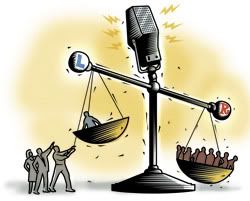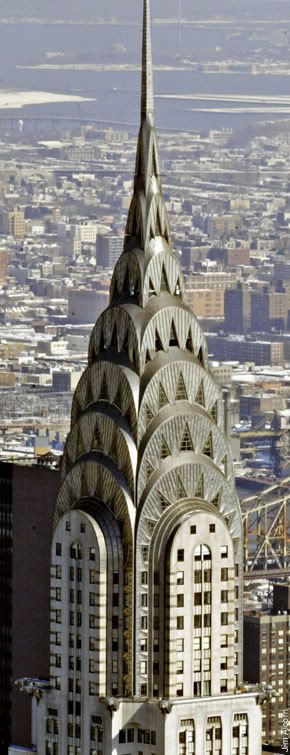
There may be some Democrats talking about reimposing the Fairness Doctrine, but one very important one does not: Presumptive presidential nominee Barack Obama.
Over at Broadcasting & Cable, John Eggerton reports:
The Illinois senator’s top aide said the issue continues to be used as a distraction from more pressing media business.
"Sen. Obama does not support reimposing the Fairness Doctrine on broadcasters," press secretary Michael Ortiz said in an e-mail to B&C late Wednesday.
"He considers this debate to be a distraction from the conversation we should be having about opening up the airwaves and modern communications to as many diverse viewpoints as possible," Ortiz added. "That is why Sen. Obama supports media-ownership caps, network neutrality, public broadcasting, as well as increasing minority ownership of broadcasting and print outlets."
The Fairness Doctrine issue flared up in recent days after reports that House Speaker Nancy Pelosi (D-Calif.) was talking about a Democratic push to reinstate it, although it was unclear at press time whether that was a new pledge or the restating of a long-held position.This is not good news.
Conservative paper Human Events reported that Pelosi was not planning to bring to a vote a bill to block the reimposition of the doctrine.
The paper went on to say that Pelosi “added that ‘the interest in my caucus is the reverse’ and that New York Democratic Rep. ‘Louise Slaughter has been active behind this [revival of the Fairness Doctrine] for a while now.’”
But it was unclear whether Pelosi was talking about a push, or simply restating her long-held view that the doctrine should return.
President George W. Bush pledged to veto any attempt to legislatively establish the doctrine, and Rep. Ed Markey (D-Mass.) told B&C in an interview last fall that there were no plans to try to bring the doctrine back.
One year ago, the House passed a bill, from Indiana Republican and former radio talker Mike Pence, that put a one-year moratorium on funding any Federal Communications Commission reimposition of the doctrine. Democrats, led by David Obey (D-Wis.), suggested that the amendment was a red herring, a nonissue and that it was being debated, such as it was -- no Democrats stood to oppose it -- to provide sound bites for conservative talkers and "yap yap TV," who had ginned up the issue.
In a Shakespearian mood, Obey said the amendment was "much ado about nothing" and "sound and fury, signifying nothing."
It was a permanent version of that moratorium, also pushed by Pence, that Pelosi was reportedly saying would have no chance.
But other Democrats suggested that the sticking point was the current administration, and some big names, including Sen. John Kerry (Mass.), talked about the possibility of bringing it back. Sen. John Edwards (N.C.) went so far as to say he would make the doctrine part of his media agenda.
The Fairness Doctrine required broadcasters to air both sides of controversial issues. The FCC found the doctrine unconstitutional back in 1987, and President Reagan vetoed an attempt by congressional Democrats to reinstate it.
It is a sensitive topic with Republicans, who fear that Democrats will use it to try and rein in conservative talk radio, the rise of which followed the scrapping of the doctrine.
In the wake of press reports about Pelosi's comments, Rep. John Boehner (R-Ohio), a longtime foe of the doctrine, said its return would be "nothing less than a sweeping takeover by Washington bureaucrats of broadcast media, and it is designed to squelch conservative speech on the airwaves."
Pelosi's office had not returned calls at press time on what she said, and meant, by her comments to the paper.

